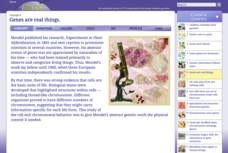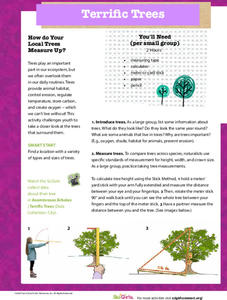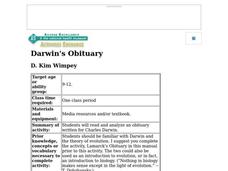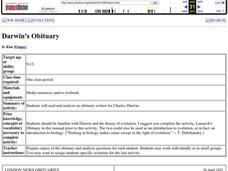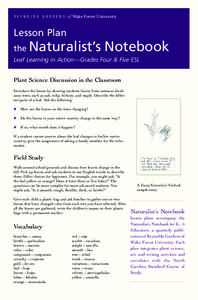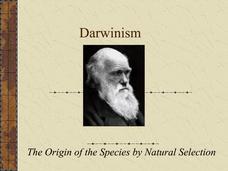Garden Earth Naturalist Club
Parts of a Flower! Flower Dissection
Sometimes the best way to learn about plants is to see the different parts of a plant yourself. Groups of learners dissect flowers to answer questions about what they observe and what they wonder about their flower.
National Science Teachers Association
Hop into Action
Young scientists find out what makes amphibians such unique and interesting animals in this simple life science lesson. After looking at pictures and discussing the characteristics of amphibians, learners complete a series of three Venn...
Lerner Publishing
Teaching Habitats
What makes up a habitat? Use this resource to engage first graders in the exploration of desert, wetland, forest, and ocean habitats. Youngsters classify plants and animals into the four distinct habitats through drawings and cutting and...
Seussville
What Can Your Class Do?
Inspire scholars to do their part for planet Earth with a read-aloud of Dr. Seuss's The Lorax, and variety of activities designed to boost the environmental activist in us all. Activities include writing poems about the Earth, sorting...
Cold Spring Harbor Laboratory
Genes Are Real Things
Proving microscopic structures exist is a difficult task. Learn how scientists did just that in the mid-1800s as they set out to identify the cellular structures related to genetics. The online lesson explains the collection of work that...
PBS
Season Seeking
It's a time of change. A hands-on activity engages young scientists in a lesson highlighting the change of seasons. They brainstorm indicators of season changes in nature and then look for them. Next, they record observations in a field...
PBS
Terrific Trees
Engage in a shady activity to practice measurement techniques. Classes venture outside to collect measurements of various trees, using different strategies to measure the height, trunk circumference, width, and crown size. Then they...
Curated OER
Conserving Chemical Resources
Young scholars balance chemical equations and solve for gram to mole ratios.
Curated OER
Natural Beauty: Looking Sharp
Students create covers for their "nature journals" using watercolor techniques and the artistic ideas of color, depth, and focal point. This instructional activity can be used in the Science or Art classroom and meets national standards...
Curated OER
Pollution Research
Fourth graders explore pollution. They conduct preliminary research on pollution using the internet. Students share their findings with the group. They work with a group and create lists of facts on pollution.
Curated OER
Reef Sharks!
Students visit an ocean aquarium exhibit where they can observe Black tip reef sharks. They observe the shark's behavior and read any information exhibited on the walls. They complete a worksheet based on information collected.
Curated OER
A Sea Turtle Experience
Young scholars observe live green sea turtles and use their imagination to form questions about the animals. They present these questions to their teacher. Students then complete the activity sheets highlighting sea turtle biology and...
Curated OER
Inviting Butterflies to the Schoolyard
Pupils create a butterfly garden. In this butterfly garden instructional activity, students plot a garden with plant species that will attract butterflies. Pupils learn about the specific plants and items that will help butterflies use...
Curated OER
Forest Communities
Students identify tree specimens. In this tree specimens lesson, students collect different parts of a tree from the areas around the school or their home. They then work in groups to create booklet that identifies tree specimens.
Curated OER
Darwin's Obituary
Students read and analyze an obituary written for Charles Darwin. They are already familiar with Darwin and the theory of evolution. This is an introduction to evolution, or in fact, an introduction to biology.
Curated OER
Darwin's Obituary
Learners read and analyze an obituary written for Charles Darwin. They make a list of facts about Darwin they learned from the obituary. Students compare Lamarack's theory to Darwin's.
Curated OER
Plant Science Discussion in the Classroom
Learners are introduced to the lesson by showing them leaves from common deciduous trees, such as oak, tulip, hickory, and maple. They describe the different parts of a leaf. Students are asked the following questions: How are the...
Curated OER
Structural and Behavioral Adaptations
Learners participate in a role playing lab that allows students to experience how different beak adaptations play a role in the type of food the animal can eat, therefore playing a role in the survival of the species.
Curated OER
Migration
Students study reasons for and examples of bird migration as a behavioral adaptation. They investigate the Bernoulli's Principles.
Curated OER
Natural Communication
Students investigate communication as an adaptation by examining visual, tactile, chemical and auditory communication. They study the characteristics of the red fox an songbirds.
Curated OER
The Peppered Moth
In this evolution worksheet, students read about the changes the peppered moth went through over 100 year time period. Students complete 3 short answer questions based on what they read.
Curated OER
Forest Ecosystem
Students take a field trip and explore a temperate rainforest. In this rainforest lesson plan, students discuss many items they see on their journey and experiment with different tree leaves.
Curated OER
Darwinism: The Origin of the Species by Natural Selection.
The Darwin PowerPoint covers many of the Scientists that worked on similar concepts to Darwin and that were involved with famous theories. students are informed about the basic thinking behind natural selection and examples of...
Curated OER
Pollution Assessment: Is Wood Lake a Good Lake?
Young scholars become aware of pollution in Richfield Minnesota's Wood Lake, identify sources of pollution in Wood Lake, learn to use variables, equations, spreadsheets and modeling software, and generate solutions for the problem.
Other popular searches
- Naturalist Journal
- Naturalist Intelligence
- Naturalist Fiction
- Naturalist Learner
- What Is a Naturalist
- Naturalist Essay
- Immigrants and Naturalist
- Book the Super Naturalist
- Naturalist Coordinate Plane
- Nutrition, Naturalist
- Naturalistic Intelligence
- Immigration and Naturalist






